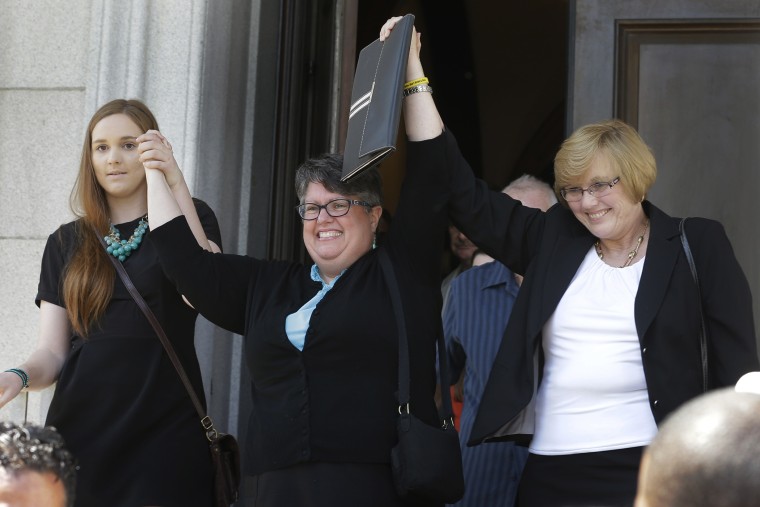RICHMOND, Virginia -- Does anyone here speak Anthony Kennedy?
Attorneys on both sides of the fight in Virginia's ban on same-sex marriage and the federal judges hearing the case sought to divine the meaning of Justice Kennedy's ruling striking down the Defense of Marriage Act last year and whether or not its reasoning makes state bans on same-sex marriage unconstitutional.
"It's a difficult one to read and get exactly what is being said," confessed Judge Paul Niemeyer of the U.S. Court of Appeals for the Fourth Circuit, one of the three hearing the case.
Reflecting Justice Kennedy's conflicted soul, divided between support for gay rights and a staunch belief in federalism, that ruling said both that the federal government should defer to the states on marriage but also said that marriage laws must "must respect the constitutional rights of persons." With Kennedy's opinion paying tribute to both federalism and the language of equal rights, both gay rights supporters and opponents have seized on Kennedy's opinion in U.S. v. Windsor to make their case. Supporters of same-sex marriage have argued that Kennedy's opinion compels striking down state bans on same-sex marriage, while opponents argue that Kennedy meant to leave the issue to the states.
Virginia has both a state constitutional amendment adopted in 2006 defining marriage as between a man and a woman and laws barring same-sex unions and recognition of same-sex marriages from other states. The American Civil Liberties Union, Americans for Equal Rights, and Lambda Legal are representing same-sex couples who seek to marry in Virginia or have their same-sex marriages recognized. The case, Bostic v. Rainey, is named for platintiff Timothy Bostic, a professor at Old Dominion University who wants to marry his long term partner Tony London and was recently denied a marriage license, and Janet Rainey, the state registrar of vital records. In February, a District Court judge ruled that the restrictions were unconstitutional.
"The essence of the Windsor opinion is that the federal government must defer to the states," argued David Nimocks, an attorney for the Christian right group Alliance Defending Freedom. Recognizing a right for same-sex couples to marry, Nimocks said, "obliterates the entire meaning of the opinion."
"The Bill of Rights trumps federalism," said Virginia Solicitor General Stuart Raphael.
So far, every single federal court that has ruled on the matter since last year has agreed with Justice Antonin Scalia's dissent, that the logic of Kennedy's opinion compels striking down not just the federal ban of recognition of same-sex marriages but the state bans as well. Yet no clear majority emerged on the appeals panel Tuesday. Judge Roger Gregory, appointed by President Bill Clinton, seemed to favor upholding the ruling striking the bans down, saying that the right to marriage was defined not by the gender of the spouses, but the ability to choose who you want to marry.
"It's choice, individual choice," Gregory said. "Isn't that the essence of the right?" When David Oakley, an attorney defending the bans, argued that the restrictions were justified by a state interest in wanting to "steer the procreative potential of same-sex couples," Gregory said Oakley's argument "sounds like a totalitarian system where people are baby-makers for the state."
Gregory later grew impatient with Nimocks, one of the attorneys defending the bans. "Why do you want to deny them all those warm and wholesome things about marriage?" Gregory asked, referring to children being raised by same-sex parents. "Do you think the child loves the parents any less because they're same-sex parents?" Gregory demanded.
"Not at all," Nimocks replied.
"Why does Virginia want to rip that from the child?" Gregory asked.
Niemeyer, who was appointed by President George H.W. Bush, seemed equally convinced that the bans were constitutional. "Every person in this room is the product of a marriage," Niemayer said of the chamber, which was filled with hundreds of people who may or may not have had parents who were married. "You need a man and a woman to have a family," he said.
Niemeyer described heterosexual and same-sex marriage as "two totally different relationships that have two different purposes in society," and said "to call both relationships marriage doesn't make sense."
Niemeyer also said of same-sex marriage, "you cannot make that union the same" as same-sex marriage.
"It is the same," said Ted Olson, the former Bush solicitor general who has championed the cause of same-sex marriage as an attorney with Americans for Equal Rights.
Niemeyer also asked whether Olson's logic that the "freedom to marry or not" couldn't be infringed upon by the state would prevent government from banning polygamous or incestuous marriages. Olson said it wouldn't, because the state has "overwhelming societal interests" in banning them.
Only Judge Henry Floyd refused to show his cards. Appointed by President George W. Bush to the District Court in South Carolina, and then elevated to the Fourth Circuit by Barack Obama, Floyd sat quietly for most of the ruling, but challenged both supporters and opponents of Virginia's marriage restrictions as to whether Kennedy's ruling in Windsor backed their argument.
Looming over the proceedings was Loving v. Virginia, the landmark case from nearly 50 years ago that invalidated state bans on interracial marriage. Olson said last month that he and colleague Ted Boies chose the Virginia case precisely because of its resonance to the fight for same-sex marriage.
Shortly after the hearing, the coalition representing the same-sex couples challenging the ban held a press conference. Emily, the teenage old daughter of two of the plaintiffs, Carol Schall and Mary Townley, stepped up to the microphone.
"These are my two moms and this is my family," Emily said. "We love each other and we do what families do."
